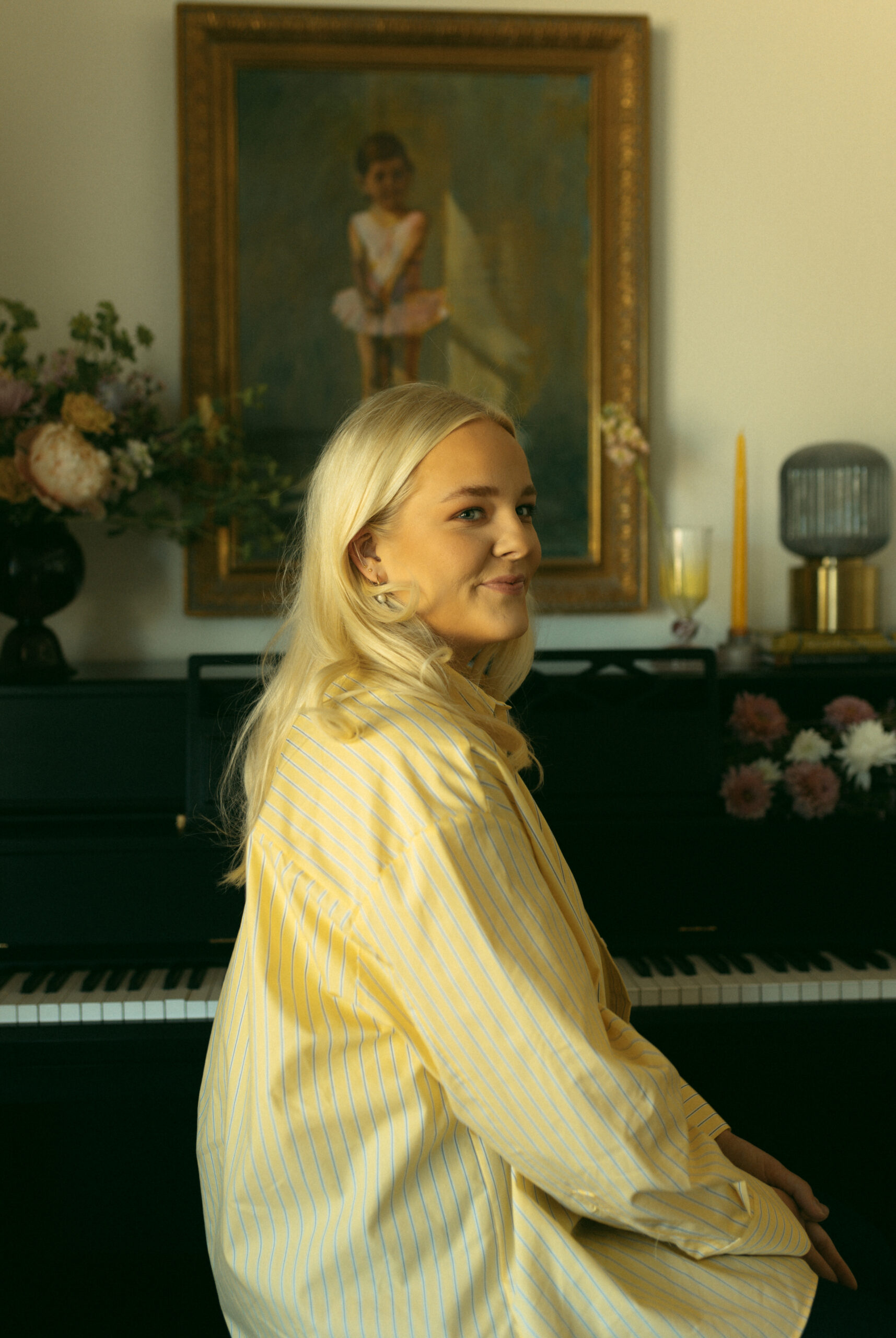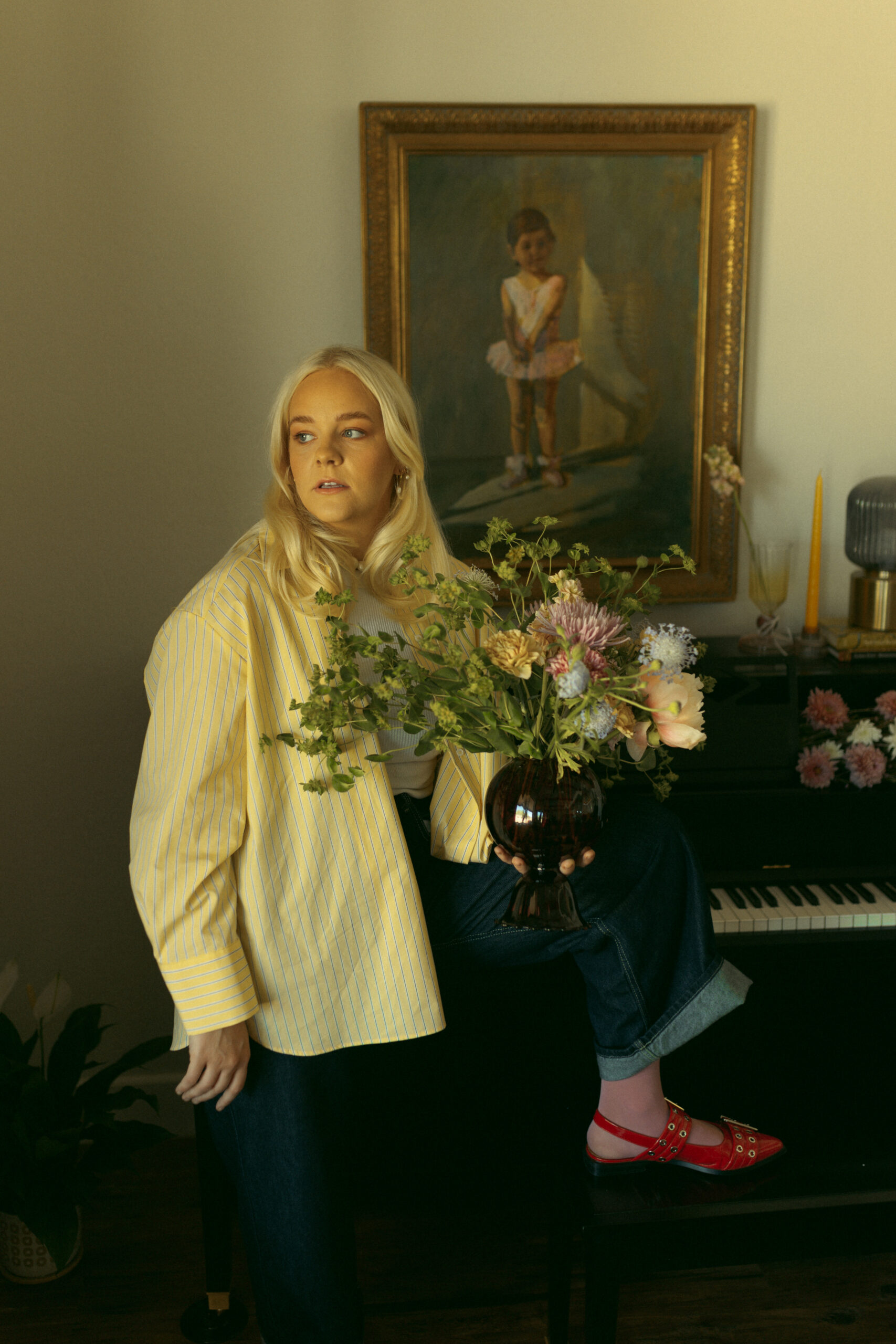Interview by Carol Wright | Photos Courtesy of Emma Nissen
When you hear the beginning of Emma Nissen’s song “Angels,” you’re immediately transported as the strings pull you in. Listeners across the internet feel the same way, with many people expressing their excitement about being alive at the same time as Nissen’s music. The singer-songwriter talked to NYOTA about songwriting, collaborating with Seth Mosley and Stephen Nelson, and her brother taking control of her music education.

With your entire family having a passion for music, was there a world where you wouldn’t have explored pursuing the arts professionally?
Oh, absolutely. I don’t know that I started out believing I could do it. I am fortunate enough to have a dad who graduated from CalArts with an acting degree and who I knew would support me if I ended up pursuing the arts as well. And, of course, my mother is my biggest cheerleader regardless. But for a long time, I actually wanted to be a midwife or an OBGYN. I knew I would travel for work. Whether it was with OBGYN or some humanitarian aid. But if I’m being completely honest, I don’t know that I was ever cut out for medical school. I was completely enamored by the thought of becoming a midwife. I was constantly looking up schools and programs and mapping it all out in my mind. I used to read articles and watch YouTube videos of everything it took to be a midwife. What they did, what kind of stories they had, what was a typical day, and what were the different places you could work as a midwife? But during college, when I had a scholarship for a vocal performance degree, I didn’t think it would be my professional career. It wasn’t until I moved to Salt Lake City at the end of 2023 that it took off in a way I was genuinely enjoying, and I knew it could be sustainable, so I dived right in.
Tell our readers a bit about what led you to jazz. Was it the genre that best fits your vocal style, or is it the type of music you gravitate to most?
I have always been an old soul. Eating cheese and watching PBS with my parents on the weekend. They always played the classics in our house—everything from Stevie Wonder to Billy Joel to Debussy. But the gateway to jazz I would say, was my brother’s doing when I was 8. My older brother Simon, who now has a master’s in conducting and choral education, sat me down one day and decided I was going to properly start my music education. We started by just recognizing which notes paired well with different chords, then moved on to the sour notes and how to turn them into “good” ones. We would sit at the piano for hours, just improvising over different chord progressions. Then he would have me pick out some songs like Otis Redding’s “(Sittin’ on) The Dock of the Bay” or ABBA’s “Take a Chance on Me,” and I would learn them but was quickly finding I liked making them “my own.” I remember my brother being particularly adamant that I should find the classic songs and not just the pop songs like everyone else. This turned me to dive deeper into what was already being played in my home. I found I loved Frank Sinatra, and from there, I found Ella Fitzgerald. It was over. She bewitched me. My love for improv turned into a love of scat singing, which naturally led me to a love for jazz as a whole. It paired well with my geriatric love of cheese and nostalgic heart.
Before you had those creative bursts where you wrote songs such as “Hear Him” and “Gotta Have Faith,” you thought songwriting wasn’t for you. In the past, did you overthink the songwriting process?
Before writing “Gotta Have Faith,” my songwriting ability was, I would say, nonexistent as far as lyrics go. But as I was figuring out how to play the piano and the songs I loved better, I subconsciously learned the musical writing process. As for the lyrics, I cannot take full credit. They truly felt inspired. The first music I wrote was Christian, but even after that, when I began writing secular, it felt like just a natural process where I never had to think I would just sit at the piano and the words would take shape with the music and the music would draw out the words. It’s always had to be and always will be organic. It only started in the first place because I had no expectations of myself. I didn’t know this would be my career. I was doing it out of pure passion. That allowed me to let go of the critique, is this right? Does this sound good? Will this be a hit? Who cares! Making music was suddenly the best thing ever, and I wasn’t going to let someone’s opinion get in the way of my hobby. It just so happens now that everyone’s opinion supports my hobby. I wrote a lot in 2020-2022. I was hurt and healing those years. Now, I’m a different kind of hurt and healing, and I haven’t written very much these past two years. But I won’t put pressure on myself. I just want to make sure I live a life filled with emotion and inspiration, and the songwriting will take care of itself.
As your debut album, Love Like You, came together, did you have exact themes you wanted to explore, or did it take time for it all to take shape?
I started writing music while living in Sweden during the pandemic, and I was in a place spiritually where things like hope, love, acceptance, and forgiveness were the themes of my life. I never wrote with an album in mind. I lived each day awaiting the next wave of inspiration and simply didn’t ask questions. I knew it was the beginning of a new phase in my life, my career, my spirituality. I didn’t want to interfere by trying to take control. I left that to God.

What was the collaborative process like between you and your producers, Seth Mosley and Stephen Nelson?
The producers on this album have been ever so patient with me. As I learn the lingo, the industry, my own style even. Every song took shape before our eyes as it took time to rediscover what these songs were meant to sound like. They were some of the world’s most patient and kind men who helped me not only find my sound but thrive. They let me spew my wild ideas of full gospel choirs or full orchestras and then somehow pulled it off better than I could imagine with their own creative magic.
On social media, listeners have shared that they’re excited to be alive during a time when Christian music sounds like yours. How does it feel seeing so many young people connect with what you’re putting out?
I feel honored. It’s surreal that a group of any size would be invested in your craft and your success, especially when it is completely authentic. The music being made now has people of all faiths linking arms and saying how cool is this? I feel that my generation is starting to ask a lot of “why’s” and “what’s the point” to a lot of the structures we have been raised in. A lot of black-and-white thinking in our societies or in our various communities is being challenged by the ever-growing gray areas as we start to wonder aloud. We need to not feel threatened by not knowing. That’s what my music is about. There’s a whole lot more of us that don’t actually know what’s going on than that do. We may not agree on semantics, but we can agree that it’s important to have faith, hope, love, forgiveness, and to believe in something, and we can groove to that.
Since working on the album, has your relationship with God been strengthened?
I would say my relationship with God is ever-changing. My understanding and idea of who God is to me is also ever-changing. Sometimes, we get caught up in our human lives and forget there may be something bigger. I try to remember to be grateful everyday and look for the role God plays in my life. Music is my constant reminder that this world is bigger than my life, and that turns me to my belief and hope that God is there and loves all of us. So yes, every day I have with music, even when it’s not about Jesus, I feel like there is something more, and that strengthens my belief and hope that God is.
What advice do you have for aspiring singers?
To the aspiring singers out there I would caution you to be yourself always. You must check in with yourself and say how is my mind? How is my heart? Am I doing this because it brings me and others joy? How Marie Kondo of me, I know. Be happy and be kind. Follow your gut. You know what to do.
This story first ran in Issue 38: The Music Issue. Read more from the issue here.





